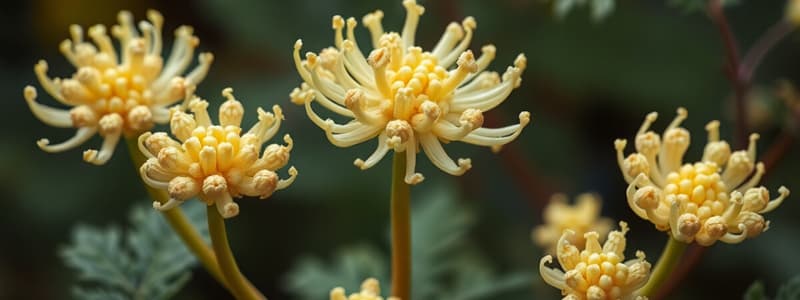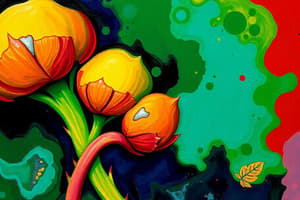Podcast
Questions and Answers
What is the definition of heredity?
What is the definition of heredity?
Which of the following best describes the term 'traits'?
Which of the following best describes the term 'traits'?
What type of offspring results from asexual reproduction?
What type of offspring results from asexual reproduction?
Which of the following is NOT an example of asexual reproduction?
Which of the following is NOT an example of asexual reproduction?
Signup and view all the answers
Which advantage of asexual reproduction allows for rapid population growth?
Which advantage of asexual reproduction allows for rapid population growth?
Signup and view all the answers
What does 'nature vs nurture' refer to in the context of offspring?
What does 'nature vs nurture' refer to in the context of offspring?
Signup and view all the answers
Which process involves a parent producing many spores?
Which process involves a parent producing many spores?
Signup and view all the answers
Why is little or no parental care considered an advantage of asexual reproduction?
Why is little or no parental care considered an advantage of asexual reproduction?
Signup and view all the answers
What is a significant disadvantage of asexual reproduction?
What is a significant disadvantage of asexual reproduction?
Signup and view all the answers
What defines sexual reproduction?
What defines sexual reproduction?
Signup and view all the answers
Which of the following is NOT a disadvantage of sexual reproduction?
Which of the following is NOT a disadvantage of sexual reproduction?
Signup and view all the answers
What occurs during the process of crossing over in meiosis?
What occurs during the process of crossing over in meiosis?
Signup and view all the answers
What is the correct human haploid number of chromosomes?
What is the correct human haploid number of chromosomes?
Signup and view all the answers
What is produced as a result of meiosis?
What is produced as a result of meiosis?
Signup and view all the answers
During fertilization, which event occurs first?
During fertilization, which event occurs first?
Signup and view all the answers
Which mode of reproduction results in offspring that are genetic clones of the parent?
Which mode of reproduction results in offspring that are genetic clones of the parent?
Signup and view all the answers
What is the primary purpose of pollination in plants?
What is the primary purpose of pollination in plants?
Signup and view all the answers
Which feature is unique to meiosis compared to mitosis?
Which feature is unique to meiosis compared to mitosis?
Signup and view all the answers
In terms of genetic material, what does 'diploid' mean?
In terms of genetic material, what does 'diploid' mean?
Signup and view all the answers
What distinguishes self-pollination from cross-pollination in plants?
What distinguishes self-pollination from cross-pollination in plants?
Signup and view all the answers
Which stage of meiosis is characterized by the alignment of homologous chromosomes?
Which stage of meiosis is characterized by the alignment of homologous chromosomes?
Signup and view all the answers
Study Notes
Asexual Reproduction
- Definition: Formation of offspring without a mate. Produces identical offspring.
- Types:
- Binary Fission/Mitosis: Replication of DNA, cell elongation, division into two daughter cells. Examples: Bacteria, Protists, Amoebas.
- Budding: Parent produces a small bud (smaller version of itself). Bud may detach or stay attached to form a colony. Examples: Hydra, Yeast, some corals.
- Spore Production: One parent produces many spores (like seeds). Examples: Fungi, Molds, Ferns.
- Fragmentation: A piece of an organism breaks off and forms a new individual. Examples: Starfish, Flatworms (like planaria), some plants (like pothos and spider plants).
- Vegetative Reproduction (Propagation): Plant reproduction not involving seeds. Examples: Strawberries (runners), potatoes (tubers), aspen trees (suckers), cuttings, grafting, tulips/daffodils.
Advantages of Asexual Reproduction
- Large numbers of offspring quickly
- No energy needed to find a mate
- Little/no parental care
- Only one organism needed
Disadvantages of Asexual Reproduction
- Offspring are clones (vulnerable to disease/harmful mutations)
- Extreme temperatures can wipe out entire colonies
- Offspring compete for resources (food, space)
Sexual Reproduction
- Definition: Reproduction using male and female reproductive cells (gametes). Produces genetically varied offspring.
- Advantages: Genetic variation—helps organisms survive in changing environments.
- Disadvantages: Takes time (finding a mate, gamete fusion), exposure to risks (disease, predators, harsh environments when finding a mate), fewer offspring, longer time for offspring to mature, offspring may need care.
Meiosis
- Process: Creates four haploid daughter cells, all genetically different. Involves two cell divisions.
- Stages: Prophase I (chromosome condensation, nuclear membrane disappears, crossing over), Metaphase I (homologous pairs line up), Anaphase I (homologous chromosomes separate), Telophase I/Cytokinesis (two haploid cells form), Prophase II, Metaphase II, Anaphase II, Telophase II/Cytokinesis (4 haploid cells form)
- Haploid: Half the genetic material (n).
- Diploid: Double the genetic material (2n).
- Human Haploid number: 23
- Human Diploid number: 46
Heredity, Traits, Genes, Offspring (Nature vs. Nurture)
- Heredity: Passage of biological traits from parents to offspring. Determined by genes.
- Traits: Genetically determined physical or behavioral characteristics (eye color, bird nesting).
- Genes: DNA segments influencing heredity.
- Offspring: New living things from one or more parents. "Nature" refers to genes (inherited traits), "nurture" refers to the environment's impact.
Fertilization
- Definition: Male and female gametes combine, nuclei fuse to form a single cell (zygote).
- Human process: Sperm meets egg in fallopian tube, sperm's head breaks down egg membrane, nuclei fuse, zygote forms.
Plant Reproduction
- Self-pollination: Pollen arrives from the same plant.
- Cross-pollination: Pollen lands on different plant (same kind).
- Pollination methods: Wind, water, insects (bees, butterflies), and animals.
- Seed formation: Pollination, Germination, Penetration, Fertilization (nuclei fuse), fertilized ovule forms seed.
Gametes
- Definition: Sex cells with half the chromosomes of a normal body cell (haploid).
- Animals:
- Male gamete: Sperm
- Produced in: Testes
- Female gamete: Ovum (egg cell)
- Produced in: Ovaries
- Plants:
- Male gamete: Pollen
- Produced in: Anther
- Female gamete: Ovum (egg cell in ovule)
- Produced in: Ovule
Studying That Suits You
Use AI to generate personalized quizzes and flashcards to suit your learning preferences.
Description
Test your knowledge on asexual reproduction, its types, and advantages. This quiz covers key concepts such as binary fission, budding, and vegetative reproduction, providing examples from various organisms. Challenge yourself to understand the mechanisms and benefits of this unique reproductive strategy.




